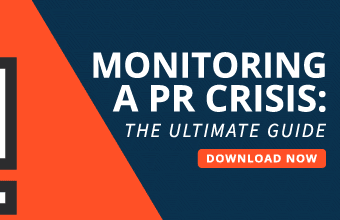This has been the year of crisis management in PR. From Volkswagen’s emissions scandal, to ex-Subway mascot Jared Fogle’s “mild pedophelia,” companies are seeking best practices for building and implementing their online reputation management strategies.
And with social media being the unforgiving beast that it is, managing one’s reputation online can be quite a doozy.
Most companies looking to keep a close eye on their virtual reputations typically have a media monitoring strategy in place. Though media monitoring—especially social media listening—can help identify potential crises and mitigate damage by allowing companies to respond quickly and intelligently, effective reputation management plans are proactive rather than reactive.
Understanding tone
To create a proactive reputation management plan, companies must have a fundamental understanding of their current digital audience. And media monitoring can help with this. By toning previous audience engagements, an in-depth analysis can identify which topics/corporate actions resonate poorly with a company’s audience, and which ones resonate well. This intelligence allows companies to create pre-tailored responses should these topics, or similar ones, arise in the future.
Looking to geography
Media monitoring can also help identify which geographical regions are most influential in a company’s social space. This allows companies to critically assess the area’s cultural, political and economical influences, and get a better understanding of how certain issues and topics impact this region. Again, this type of intelligence allows companies to tailor their messaging and engagement strategies to be more appropriate for their target demographic.
Comparing online reputations of competitors
Closely monitoring competitors also offers further audience insights. By having a better understanding of what its competitors have done, what the public response has been, and the tone of interactions, a company can evaluate its current reputation management initiatives and how they compare to its top competitors.
Being transparent
But understanding a digital audience is only one piece of the reputation management puzzle. Another is transparency. Companies need to be as transparent as possible when it comes to engagement strategies, because hiding anything important can have a negative impact on a company’s reputation.
In order to proactively manage their reputation online, companies should strive to be honest and upfront with any potential risks, conflicts, criticisms that might come up about their product or service.
According to Entrepreneur Magazine, transparency helps foster better relationships, better aligns your brand with its audience and employees, helps to quickly find solutions to problems, and increases engagement. Transparency also allows communications and public relations professionals to create an outreach and engagement plan surrounding announcements and data releases, allowing companies to stay ahead of any possible backlash.
Media monitoring and analysis can also help develop communications plans around transparency. By knowing how audiences have reacted to similar information released by other companies, businesses can build intelligent relationship management plans that can mitigate potential risks and damages that could be associated with the release.
Though some situations, even with the utmost preparation, can’t be predicted (i.e. Jared Fogle and Subway), it’s important for companies to proactively research ways to better connect with their audiences.
By finding the above insights, creative a well-thought communications plan, and assessing potential risk, companies can proactively manage their reputation online and continuously foster positive relationships with their audiences and customers.
Related articles:
The power of association: Protecting your reputation when partners go astray








